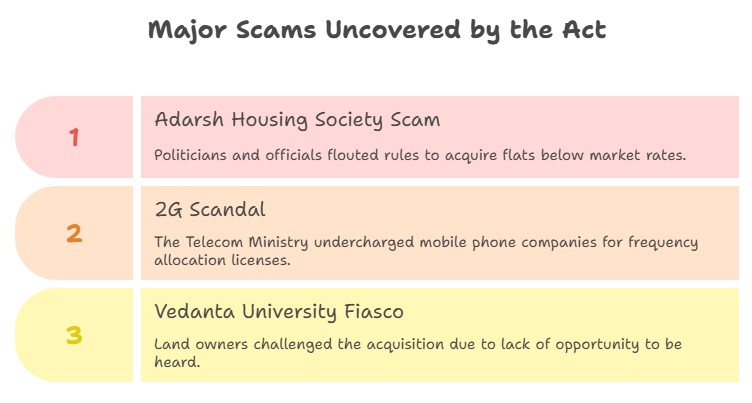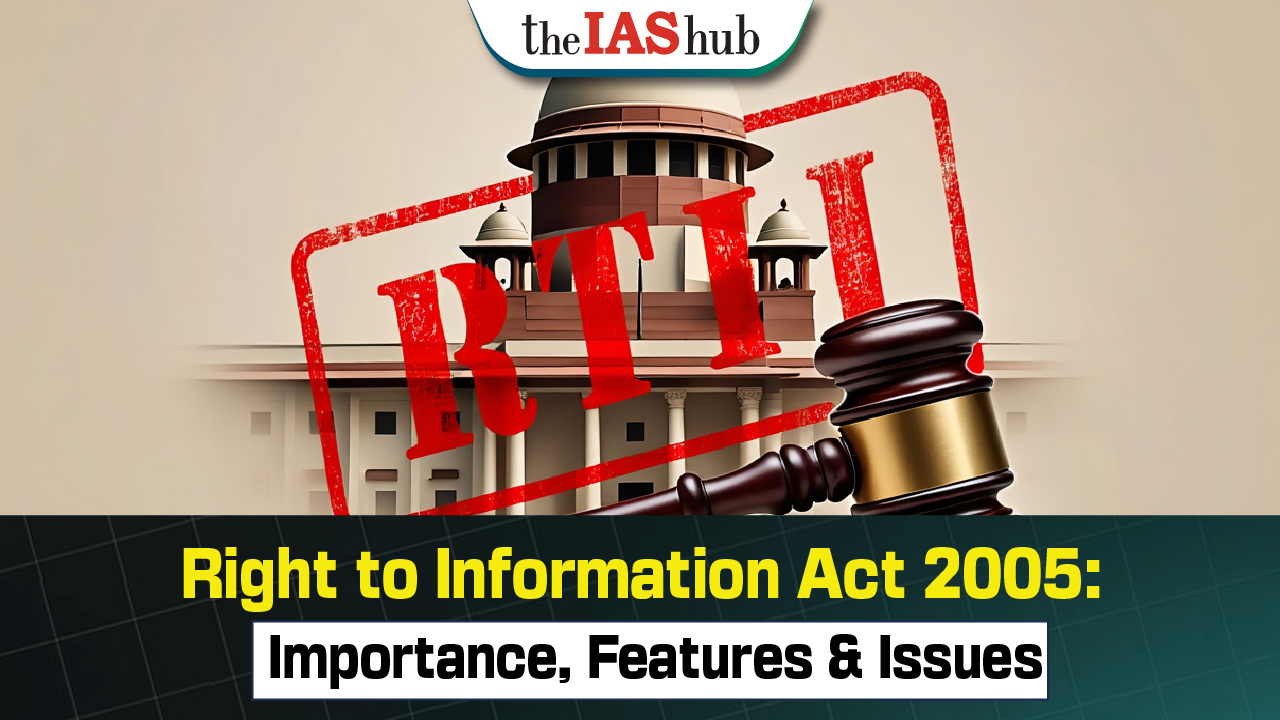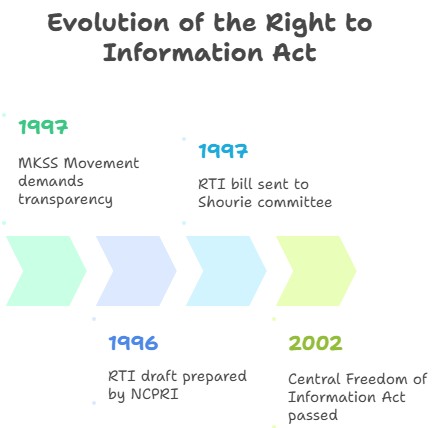“Information is the currency of democracy,” Thomas Jefferson
- Right to information is cornerstone of participatory democracy and is seen as a basic necessity of good governance. It not only promotes transparency and accountability but also empowers people by opening government’s records to public scrutiny.
- Global Recognition: Right to seek, receive, and impart information forms a part of the Article 19 of the Universal Declaration of Human Rights encompasses the right to freedom of opinion and expression, including the.
- Constitutional Status: Right to Information is implicit part of the freedom of speech and expression under Article 19(1) of the Constitution as ruled by Supreme Court in Raj Narayan vs State of Uttar Pradesh (1976).
Parliament enacted the Right to Information Act in 2005 which is hailed as a path breaking step in India’s legislative journey.
What is Right to Information Act 2005?
It is a legislation that sets out a system through which citizens can access the information which are under the control of public authorities.
Roots and Evolution of the Right to Information Act 2005
- The 1997 Mazdoor Kisan Shakti Sangathan (MKSS) Movement focused on demanding transparency in rural development programs and led to the formation of the "Jan Sunwai" (public hearing) model, which brought public officials and citizens together to discuss and resolve grievances.
- In 1996, a RTI draft was sent to the government, which was prepared by NCPRI and other related activist with the help of press council of India in the guidance of Justice PB Savant.
- In 1997, this bill was sent to the Shourie committee which was setup by the government to providing recommendations regarding practicability of this bill.
- The Central Freedom of Information Act 2002 was passed by both houses of Parliament and received presidential assent but was never notified and therefore never became effective.
Key Features of the Right to Information Act, 2005
- Scope and Applicability: As per Section 1(2) RTI Act applies to the whole of India. It covers the central government, state governments, and all public authorities defined under the act.
- Public Authorities: The RTI Act defines "public authorities" under section 2(h) as including government departments, ministries, and public sector undertakings.
|
"Public authority" means any authority or body or institution of self-government established or constituted—
- by or under the Constitution;
- by any other law made by the Parliament/State Legislature.
- by notification issued or order made by the appropriate Government, and includes any—
- body owned, controlled or substantially financed.
|

- Requesting Information: RTI application should be in writing, either in paper or electronic form, and clearly state the information sought. The applicant must pay a nominal application fee. Gujarat Information Commission has recommended to the state government to increase the fees to a maximum of Rs 100 from the Rs 20 charged presently.
- Timeframes and Response: The public authority is required to respond within 30 days. In cases involving the life or liberty of a person, the response time is reduced to 48 hours. Failure to provide a response within the specified timeframe may attract penalties.
- Exemptions: Section 8 (1) exempts information whose disclosure can affect sovereignty and integrity of the country, the security, strategic, scientific or economic interests of the State, relation with foreign State or lead to incitement of an offence. Section 8 (2) provides for disclosure of information exempted under Official Secrets Act, 1923 if larger public interest is served. Section 24 provides that the Act does not apply to the security and intelligence organizations mentioned in the Second Schedule of the Act.
- Information Commissions: The RTI Act establishes independent Information Commissions at the central and state levels. These commissions are responsible for ensuring the proper implementation of the act, hearing appeals, imposing penalties on non-compliant public officials, and promoting transparency.
- Whistleblower Protection: The RTI Act includes provisions to protect whistleblowers who disclose information in the public interest.
- Proactive Disclosure: The RTI Act emphasizes proactive disclosure of information by public authorities. They are required to publish certain categories of information on their websites or through other means, promoting transparency without the need for individual RTI applications.
Major Scams Exposed Under the Right to Information Act 2005
- Adarsh Housing Society scam: How politicians, bureaucrats and military officials flouted rules to acquire flats below market rates was exposed. It culminated in the resignation of the then Maharashtra Chief Minister whose own relatives were allottees in the building.
- 2G scandal: It involved the Telecom Ministry, led by Andimuthu Raja, undercharging mobile phone companies for frequency allocation licenses which costed the Indian government Rs1,76,645 crores.
- Vedanta University fiasco: Land owners who challenged the acquisition in the Orissa High Court got a document under RTI revealing that government did not give them an opportunity to be heard during an inquiry authorised under the Land Acquisition (Companies) Rules, 1963, before land was bought.
 |
Challenges in the Implementation of the Right to Information Act

- Lack of Awareness: According to PWC study, only 12% of the rural population and 30% in urban population were aware of RTI Act.
- Delayed Responses: Public authorities often fail to provide timely responses to RTI applications within the stipulated timeframe which undermines the purpose of the act. Analysing how long it would take for each commission to handle a request, the longest period for disposal was in West Bengal, at 24 years and 3 months. It was followed by Odisha (5 years and 4 months) and Maharashtra (5 years and 3 months).
- Burden on Information Commissions: Information Commissions, responsible for adjudicating appeals and complaints related to the RTI Act, often face a high workload. The number of pending appeals and complaints stand at over 3 lakhs and is steadily increasing in commissions. The largest number of pending cases were in Maharashtra at 99,722 which was followed by Uttar Pradesh at 44,482 and Karnataka at 30,358.
- Harassment against Applicants: In some cases, individuals filing RTI applications or seeking information have faced harassment or threats. Such incidents can deter people due to fear of adverse consequences. Since the operationalization of the Act, around 100 RTI activists across the country have been killed and several are harassed on a daily basis.
- Incomplete Proactive Disclosure: While the RTI Act emphasizes proactive disclosure of information by public authorities, the implementation of this provision is often incomplete. The State Information Commission of Tamil Nadu has been the lowest performer in terms of RTI Act response, providing only 14% of the information requested for 2021-22.
- Limited Resources and Infrastructure: Authorities at the grassroots level, face resource constraints and inadequate infrastructure to effectively implement the RTI Act. Even some High Courts and most district courts entertain only physical RTI applications. Report Card on the Performance of Information Commissions in India, 2021-22 shows that almost 60% information commissioners were retired government officials.
Suggestions to Improve the Implementation of the Right to Information Act 2005
- Capacity Building: Provide comprehensive training programs for public officials, including administrative staff and decision-makers, to enhance their understanding of the RTI Act. Recently, Supreme Court has directed States and Union Territories to set up and operationalise online Right to Information (RTI) portals to ensure transparency in governance.
- Strengthening Information Commissions: Allocate adequate resources, including finances and personnel, to Information Commissions at the central and state levels.
- Simplify Application Process: Streamline and simplify the RTI application process to make it more user-friendly and create clear guidelines on how to frame information requests.
- Proactive Disclosure: Regularly update and maintain websites, publish relevant information in accessible formats, and proactively disseminate important government documents and reports.
- Timely Responses and Penalties: An examination of the fines issued reveals that the commissions did not apply penalties in 95% of the cases when penalties may have been imposed. Also, a negligible amount has been recovered out of the Rs 3.12 crores penalty levied by 24 Central and state information commissioners in FY21-22.
- Encourage Whistleblower Protection: Establish robust safeguards to prevent victimization of whistleblowers and create awareness about the protection provisions under the act. As per the Commonwealth Human Rights Initiative (CHRI), across country, 99 RTI activists have lost their lives, 180 assaulted and 187 have been threatened since 2006.
- Awareness Campaigns: Conduct extensive awareness campaigns to educate citizens about their rights under the RTI Act targeting both urban and rural areas.
- Proper Record Management: Encourage the use of digital platforms for storing and retrieving information, and train officials on maintaining accurate and accessible records.
- Public Participation: Encourage and facilitate public participation in the implementation of the RTI Act. Establish mechanisms for public feedback, consultation, and monitoring.
- Regular Review and Evaluation: Conduct periodic reviews and evaluations of the implementation of the RTI Act. Identify challenges and make necessary improvements to enhance its implementation.
Conclusion
The RTI Act is considered as one of the most successful laws which gave ordinary citizens the right to ask questions to government authorities and equipped them with some means to take on corruption. However, like any other legislation, the RTI Act has also problems in its effective implementation which need to be addressed. With the advancement of time, there is a need to enlarge its scope for greater transparency and accountability.















